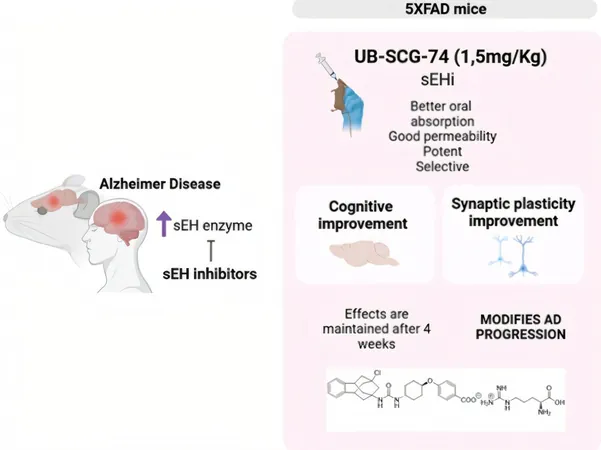
Revolutionary Alzheimer's Drug Candidate Shows Promise in Fighting Neuroinflammation and Preserving Neurons
2025-04-01
Author: Rajesh
Revolutionary Alzheimer's Drug Candidate Shows Promise in Fighting Neuroinflammation and Preserving Neurons
In a groundbreaking advancement in the pursuit of a treatment for Alzheimer's disease, a team of researchers from the University of Barcelona has developed a novel therapeutic candidate that displays significant neuroprotective and anti-inflammatory effects. As the most common cause of dementia, Alzheimer's currently impacts over 800,000 individuals in Spain alone, with existing treatments offering only limited support during the disease’s mild stages.
Published in the journal ACS Pharmacology & Translational Science, the study showcases a new drug that operates on dual fronts: reducing neuroinflammation—a critical component of Alzheimer’s pathology—and protecting neurons from degeneration. The promising results from two murine models of the disease led to the licensing of the drug’s patent to a pharmaceutical company, initiating the necessary preclinical and clinical trials for potential approval.
A Collaborative Effort Towards Discovery
The research, led by notable figures Mercè Pallàs and Santiago Vázquez, along with a dedicated team from the University of Barcelona's Faculty of Pharmacy and several esteemed institutions—including the Institute of Biomedical Research of Barcelona and the University of Bonn—represents seven years of persistent research. The team leveraged a groundbreaking approach that focused on inflammatory processes known to trigger and exacerbate Alzheimer's progression.
“Previous strategies targeting beta-amyloid accumulation were largely unsuccessful, highlighting the need to address neuroinflammation as a core aspect of the disease,” noted the authors.
The Mechanism Behind the Magic
At the heart of this new compound is its role as an inhibitor of soluble epoxide hydrolase (sEH), an enzyme integral to many physiological processes, including inflammation management. By inhibiting sEH, the drug increases the levels of beneficial epoxyeicosatrienoic acids (EETs), which are endogenous anti-inflammatories that combat neuroinflammation and foster neuron preservation.
The study reported remarkable improvements in cognitive functions like spatial and working memory among treated mice, indicating a potential preservation of neuronal health and a reduction in Alzheimer’s-associated cell death. Moreover, these EETs enhance cerebral blood flow—essential for brain health—further augmenting the neuroprotective capabilities of the drug.
A Multi-Targeted Approach
What sets this compound apart from existing therapies is its multi-faceted approach to inflammation. Traditional anti-inflammatory treatments, such as ibuprofen, have shown limited success in similar models. In contrast, this new candidate demonstrated the ability to lower multiple pro-inflammatory markers while simultaneously elevating anti-inflammatory cytokines, making it a formidable contender in Alzheimer's therapy.
Researchers pointed out the significance of this broad-spectrum effect: “By affecting several inflammatory pathways at once, this drug provides a strong neuroprotective advantage, potentially alleviating both symptoms and underlying pathological changes of Alzheimer's disease.”
Modifying the Disease Trajectory
Perhaps one of the most promising revelations from the study is the compound’s ability to not only halt disease progression but also reshape its trajectory. Even one month after ceasing treatment, the compound maintained cognitive benefits in the mice, with preserved integrity of neuron networks and dendritic structures—key factors in cognitive function.
Navigating the Road to Clinical Trials
While the findings are encouraging, the transition from laboratory promises to clinical application remains a daunting challenge. The pathway from initial research to market involves a painstaking process, including preclinical trials, rigorous clinical testing, and subsequent approval from health authorities—often spanning many years and requiring substantial investment.
The licensed patent to a U.S. pharmaceutical firm marks a pivotal step towards the advancement of this drug through preclinical and clinical testing. The research team continues to advise the company, ensuring that their valuable insight contributes to the potential development of this pioneering treatment for neuroinflammation-related conditions.
As these researchers forge ahead, the hope is that this innovative approach may one day change the landscape of Alzheimer's treatment, offering new hope to millions battling the debilitating effects of this relentless disease. Stay tuned for more updates on this promising journey towards a possible cure!




 Brasil (PT)
Brasil (PT)
 Canada (EN)
Canada (EN)
 Chile (ES)
Chile (ES)
 Česko (CS)
Česko (CS)
 대한민국 (KO)
대한민국 (KO)
 España (ES)
España (ES)
 France (FR)
France (FR)
 Hong Kong (EN)
Hong Kong (EN)
 Italia (IT)
Italia (IT)
 日本 (JA)
日本 (JA)
 Magyarország (HU)
Magyarország (HU)
 Norge (NO)
Norge (NO)
 Polska (PL)
Polska (PL)
 Schweiz (DE)
Schweiz (DE)
 Singapore (EN)
Singapore (EN)
 Sverige (SV)
Sverige (SV)
 Suomi (FI)
Suomi (FI)
 Türkiye (TR)
Türkiye (TR)
 الإمارات العربية المتحدة (AR)
الإمارات العربية المتحدة (AR)